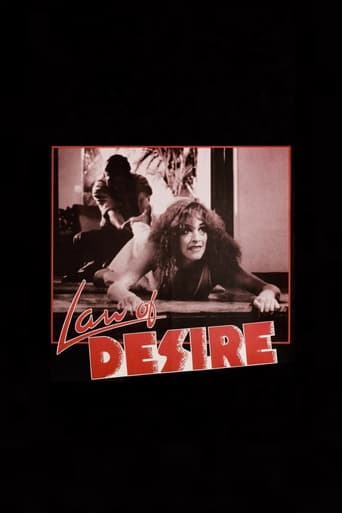hddu10
Almadovar has long duped gullible American audiences into believing he is both talented and witty, when the reality is Europeans have known for decades that he's just a master at shock value. La Ley del Deseo was one of his first gay-themed successes outside of Spain, and while Almadovar can be credited for breaking this particular barrier, he can NOT be credited with doing so without adhering to the unspoken "traditional" gay formula-- that being that one, if not both protagonists had to die tragically. Because, you know...gay. At the time, this movie was a laugh riot for all Latin American queens who loved the dirty jokes, as well as all the ultra-liberal art-types who were just learning how "cool" the whole gay scene was (remember: this is in the mid-80s when all mainstream people focused on was AIDS in the gay community). So, if you are one of those people who likes seeing all the gay "dirty laundry" (random sex, drugs, self-hatred, pornography, unhealthy relationships) thrust upon you in a big screen for shock value, then enjoy, as this film is Almodovar at his most typical.
jaibo
I just can't take to Almodovar. Much of this seems less like a parody or pastiche of a bad afternoon soap and more like a very poor example of one. There's something interesting in the typewriter being the source of all the trouble, but having a dramatis personae so near to his own circle smacks of indulgence to my eye. A bit of a yawner, all in all.The best shot - of a young man making love with his own mirror image comes from Genet's ballet Adam Miroir, and the idea that Banderas' love is a "crime" are ripped off wholesale from Genet's general point of view. But I reckon the old French thief would have found Almodovar's middle-class outrage aesthetic pretty distasteful. Almoldovar's main audience is Blairite nebulous Third Way, Guardian-reading home owners. This plays at subversion whilst actually flattering a very wealthy demographic.
tdsergito
The story is simply about a love affair intruded upon by a pathologically jealous third party. If somebody in this day and age feels that sexual orientation destroys a career in film, the person who believes such stuff clearly doesn't get out much.I liked the film. I do not ask much of a film, other than it be somehow entertaining, so I cannot pretend to any expertise as a critic. I suspect that many critics simply look for new ways to say they liked or did not like any work they view. If I were not trying to fill ten lines of space, I would stop with the clear and brief comment that I liked the film.In any event, for those who are not of a Victorian mindset and who realize that gay love affairs are no more pathological than any other love affairs, I recommend this movie.The film is not likely to be playing at local theaters, and I am finding it difficult to locate a video or DVD of the movie in Mexico; however, it is worth it to me to see the film again.
mail-873
You shouldn't believe everything you read on video boxes. It is not a "riotous comedy," it's a deeply moving meditation on desire, from physical desire to the highest kinds of love. All of the characters are searching for it, and one of the questions raised by the movie is "What is it worth?" The final scene, in which Antonio and Pablo are in the apartment, just before Antonio kills himself, is the the linchpin of the movie. Love is serious, it is not a game, and love is worth dying for. That is why Pablo throws the typewriter out the window--everything he has written hasn't been worth the paper it is written on because it assumes that love is merely a toy. In the final scene, when Pablo takes up the dead Antonio in his arms and weeps, the visual image is a lamentation, like the Renaissance paintings of Mary holding Christ in her arms after he has been brought down from the cross. Of course it is funny too in places, but funny in a way that elaborates on and deepens the main theme of the movie, "What is love worth." What Antonio teaches Pablo is that love is worth everything. What you may have been confused by is the tone of the movie, which is operatic. This is not about an investigation of individual character. Like much opera, it investigates a deeply felt--and confusing--human emotion. It is one of the great gay movies, perhaps the greatest one.




